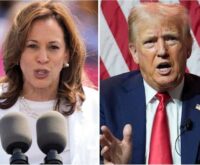By CHRISTINA A. CASSIDY
Associated Press
ATLANTA (AP) _ As the last few minutes of Georgia’s busy legislative session ticked off the clock, Atlanta Mayor Kasim Reed was hanging out with Gov. Nathan Deal and his staff to watch the action unfold.
It may not sound unusual until you think about the fact, in this era of hyper-partisan rhetoric, that Deal is a conservative Republican and Reed a key Democratic ally of President Barack Obama. The friendship between Deal, 70, and Reed, 43, has its roots in a shared interest in economic development and has blossomed into a powerful political alliance that is already paying dividends with a number of major corporations heading to Atlanta and neither man yet to face a significant re-election challenge.
“It’s pretty incredible when you think how close they are,” said Chip Lake, a longtime GOP strategist in Georgia. “With all the partisanship going on in Washington, D.C., I think people in the state expect their leaders to govern. And while this alliance may make some on the far right or on the far left skeptical, it certainly shows the two of them have a commitment to governing and are willing to put partisan differences aside.”
The mayor and governor frequently appear together at events, introduce each other as “my friend” and praise each other’s accomplishments. The two recently joined U.S. Education Secretary Arne Duncan to talk about the benefits of early childhood education. A few days earlier, they shared the stage at a conference and spoke about their friendship. Reed noted his office was just 300 steps or so from the governor’s office at the Capitol, “but you would have thought in Georgia over the last 30 or 40 years, regardless of party, that walk was a 10K.”
In fact, when Deal walked to City Hall for a news conference earlier this year to announce a deal on funding a new NFL stadium, his staff was told a governor hadn’t been across the street in 30 years. Reed, who runs the state’s largest city, with 423,000 residents, said there are a number of issues on which they find common ground. The two traveled to Washington to lobby the Obama administration on behalf of a project to deepen the Savannah River port, which Reed argues is essential to Atlanta’s success as a global business hub with companies including Home Depot and UPS.
“Folks that are playing the conflict game, where I bash you and you bash me, I think are losing across the United States of America,” said Reed, a Howard University-trained attorney who became mayor in 2010. “The old tired politics would be me trying to one-up the governor or play gotcha, but how does that help the people of the state of Georgia?”
The governor, also an attorney before being elected to Congress in 1992, said that shared motivation forms the basis of a friendship that began after a series of introductory meetings arranged by mutual friends in the General Assembly. Both are former state lawmakers, although Deal was already in Congress when Reed was first elected as a state representative.
“We don’t have time to play games, and we don’t play games with each other,” Deal said.
There are mutual benefits as well. Reed offers the Republican governor access to a Democratic president’s administration, and Deal offers the Democratic mayor an important relationship with state leaders making decisions that affect the city.
A critical moment came in 2011 when the state was looking to persuade Porsche to stay in Georgia and build its new North American headquarters in Atlanta. Deal had recently taken office, and the project quickly became a top priority for him and the mayor, who had a site in mind near Atlanta’s airport, the world’s busiest. It became clear to Porsche’s leadership that not only were the governor and mayor communicating, they were speaking in one voice.
“You could tell from their interaction that these were not two people who had to be nice to each other,” said Joseph Folz, general counsel for Porsche Cars North America, Inc. “This was a far smoother negotiation process than any prior site search for which I have been involved. I do think that is because every organization gets its character from the top.”
Folz credited Deal and Reed’s partnership with the confidence to move forward and said company officials have shared their positive experience with others in the business community.
The governor’s chief of staff, Chris Riley, said Deal and Reed are successful in focusing on shared interests and avoiding political differences.
“We don’t talk about Medicaid expansion,” Riley said. “There’s not a pro-life, pro-choice discussion going on in the Suburban as they go to an economic development meeting. Usually, it’s the mayor telling a joke, the governor laughing and I’m on the floor hysterical.”
The mayor has also won over the governor’s wife, Sandra, who took it upon herself to offer the unmarried Reed some motherly advice after they appeared together at an educational event, according to Riley.
“She told the mayor, `You need to stop dating around. It’s time for you to settle down. You’re old enough,”’ Riley said, laughing as he quoted the governor’s wife. “It was hardcore, but (Reed) loved it.”
Riley is such a fan that he donated $250 to the mayor’s re-election campaign.
“I’d vote for him if I could,” said Riley, who lives outside the city. “I truly believe that this relationship, this time in which Georgia and the city can work together to position the state to be a global hub, is truly a special time that I think is our responsibility.”
State Rep. Calvin Smyre, a longtime Democratic lawmaker who has known Reed for years, said Reed is pragmatic and focused on being a “responsive and progressive leader.” As mayor, Reed oversees a strongly Democratic city with a majority black population in a state where all the statewide elected officials are Republicans.
“He believes in working across political aisles, across race relations and across cultural relations,” Smyre said. “Mayors have to get things done.”
That’s not to say the political alliance is without risk.
The mayor is the most high-profile elected Democrat in the state, but he has gotten pushback for a deal that would use public money to help build the new Falcons stadium. He also has made comments suggesting state Democrats should focus on the 2014 U.S. Senate and 2016 presidential races. Left off the list was mention of the 2014 governor’s race, which raised eyebrows among Democrats.
When asked whether it was a sign of weakness that Democrats had yet to offer a candidate to challenge the governor, Reed said no and reiterated Deal “has done a good job as governor.”
For Deal, he found himself on the wrong side of a statewide transportation referendum last year that was opposed by tea party groups. The governor and mayor joined forces to push the local penny-sales-tax plan to raise funds for transportation projects. It was defeated across much of the state, including Atlanta, although the governor didn’t appear to lose much political capital.
Debbie Dooley with Tea Party Patriots said she wouldn’t criticize the governor for doing the same thing her group did. They partnered with the NAACP against the transportation measure.
“It’s good to reach across party lines, as long as you don’t compromise your principles,” Dooley said.
___
Follow Christina Almeida Cassidy on Twitter: http://twitter.com/AP_Christina.



![America’s Other Original Sin [Native American Slavery]](https://imdiversity.com/wp-content/uploads/160115_HIST_Comanche-01.jpg.CROP_.original-original-150x150.jpg)







